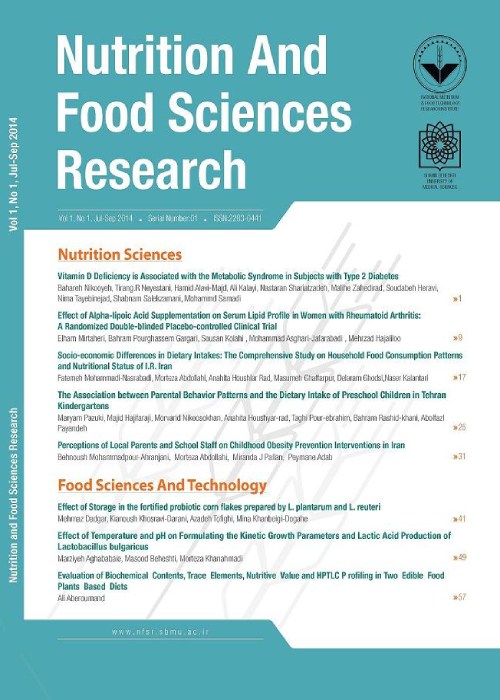Evaluation of the Efficacy of Vitamin D Supplementation With Two Different Doses During Pregnancy on Maternal and Cord Blood Vitamin D Status, Metabolic, Inflammatory and Oxidative Stress Biomarkers, and Maternal and Neonatal Outcomes: a Study Protocol
Author(s):
Article Type:
Research/Original Article (دارای رتبه معتبر)
Abstract:
Background And Objectives
Vitamin D deficiency during pregnancy is prevalent throughout the world and has been associated with complications in mothers and infants. The aim of this study is to evaluate the efficacy of two doses of vitamin D supplementation (1000 IU/d versus 2000 IU/d) during pregnancy on maternal and cord blood vitamin D status, metabolic, inflammatory and oxidative stress biomarkers as well as maternal and neonatal outcomes (birth size and Apgar score).Methods
A total of 84 pregnant women with the eligible criteria are randomly allocated to one of the two supplementation groups: (a) 1000 IU/d vitamin D which is routinely given to pregnant women, and (b) 2000 IU/d. Biochemical assessments of mothers are performed at the beginning and 34 weeks of gestation. They include serum concentrations of 25-hydroxycalciferol (25(OH)D), calcium, phosphate, intact parathyroid hormone (iPTH), fasting serum glucose (FSG), insulin, lipid profile including triglycerides (TG), total cholesterol (TC), low-density lipoprotein-cholesterol (LDL-C) and high-density lipoprotein cholesterol (HDL_C), as well as high sensitivity C-reactive protein (hs-CRP) and the maternal cell-culture supernatant concentrations of inflammatory cytokines IL-1β, IL-6 and TNF-α. Assessments of infants at delivery comprise cord blood serum concentrations of 25(OH)D, iPTH, hs-CRP, IL-1β, IL-6, TNF-α birth sizes and Apgar score.Discussion
The results obtained from the clinical efficacy trials on the appropriate dose for vitamin D supplementation during pregnancy are controversial. The current study could be a step to attenuate the existent controversy on evaluating the efficacy of two doses of vitamin D supplement on a wide spectrum of both mother and newborn outcomes. Meanwhile our study could give a clue to the policy-makers at MOH by revealing the efficacy of currently prescribed 1000 IU/d vitaminD3 versus 2000 IU/d. Language:
English
Published:
Nutrition & Food Technology Research, Volume:5 Issue: 3, Jul-Sep 2018
Pages:
3 to 10
magiran.com/p1871906
دانلود و مطالعه متن این مقاله با یکی از روشهای زیر امکان پذیر است:
اشتراک شخصی
با عضویت و پرداخت آنلاین حق اشتراک یکساله به مبلغ 1,390,000ريال میتوانید 70 عنوان مطلب دانلود کنید!
اشتراک سازمانی
به کتابخانه دانشگاه یا محل کار خود پیشنهاد کنید تا اشتراک سازمانی این پایگاه را برای دسترسی نامحدود همه کاربران به متن مطالب تهیه نمایند!
توجه!
- حق عضویت دریافتی صرف حمایت از نشریات عضو و نگهداری، تکمیل و توسعه مگیران میشود.
- پرداخت حق اشتراک و دانلود مقالات اجازه بازنشر آن در سایر رسانههای چاپی و دیجیتال را به کاربر نمیدهد.
In order to view content subscription is required
Personal subscription
Subscribe magiran.com for 70 € euros via PayPal and download 70 articles during a year.
Organization subscription
Please contact us to subscribe your university or library for unlimited access!


